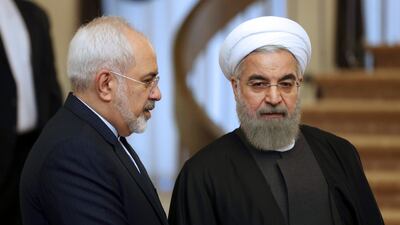If Mohammad Javad Zarif’s resignation as foreign minister is accepted by Iranian President Hassan Rouhani it will be a sour end to a remarkable chapter in diplomacy.
Together, the two men took a long and often rocky path to a nuclear deal with world powers in 2015. In Tehran, making an agreement with America is not done lightly. There was significant pressure on the Iranian pair. Allegations of treachery were directed at them in parliament.
Mr Zarif was castigated for taking a walk with US Secretary of State John Kerry during a lull in one set of negotiations in Geneva. But for more than two years Mr Zarif led the talks that culminated in the nuclear accord. So why has he decided to quit now?
The answer lies in a confluence of events more abrupt and confrontational than anything envisaged when the nuclear agreement formally came into force in January 2016.
At that time, there was a strong expectation of Hillary Clinton, a Democrat, becoming US president. While she spoke of the deal’s flaws, she never said she would seek to leave it, which was as good as Iran had hoped for. But the political calculation in Tehran was just as wrong as it was in Washington.
Donald Trump’s entry to the White House and withdrawal from the nuclear agreement – he once called it “the worst deal ever” – in May last year changed the dynamic. Hardliners in Iran have in the past nine months used the US exit to proclaim that America should never have been trusted. Mr Zarif is the first major casualty from government.
It is not common for Iranian cabinet ministers to resign so suddenly. Using Instagram as the medium for his departure message was also curious; Mr Zarif is a selective but much followed user of Twitter, where he usually posts his remarks on policy.
The Instagram message – unlike other social networks it is not blocked in Iran – may have been tailored for domestic consumption. It cited Mr Zarif as apologising for “shortcomings”, an uncharacteristically vague word for a man whose command of the English language is precise and rarely leaves doubt.
At the time of writing there is no official confirmation from the Iranian presidency that the foreign minister’s resignation has been accepted. But if it subsequently is it would be a surprise if anyone from Mr Zarif’s inner circle replaces him. Such an abrupt resignation indicates disquiet and a change in the power order in Tehran.
On Monday, when Syrian President Bashar Al Assad visited Iran’s supreme leader Ayatollah Ali Khamenei in Tehran, among the guests were Qassem Soleimani, head of the Revolutionary Guards Corps’s foreign wing, who has led Iranian military action in Syria. Mr Zarif would normally attend such a meeting but he was nowhere to be seen.
Unlike the obvious grandstanding that accompanies missile launches conducted by the IRGC – often shown on television and accompanied by bellicose remarks directed at America and Israel – diplomacy has taken place in an understated manner at the Foreign Ministry in Tehran since Mr Rouhani became president in 2013. That may change if and when Mr Zarif departs.
The sanctions reimposed on Iran by the Trump administration have weakened but not broken Iran’s economy. Mr Zarif has spent months in talks with the countries that remain in the nuclear deal – Britain, China, France, Russia and Germany – to some effect, but probably not enough.
The agreement still stands but the benefits it was meant to deliver have not materialised. The US exit has seen to that. Quietly spoken but with a steely gaze, Mr Zarif exuded immense confidence when negotiating with Mr Kerry in 2014 and 2015. The Iranian diplomat became hugely popular and was cheered when he arrived back in Tehran after the nuclear deal was concluded.
But hardliners are using a worsening economic situation to say that it is time to show a new face to the world. Do not expect that face to deploy smiles as often as Mr Zarif’s did.

